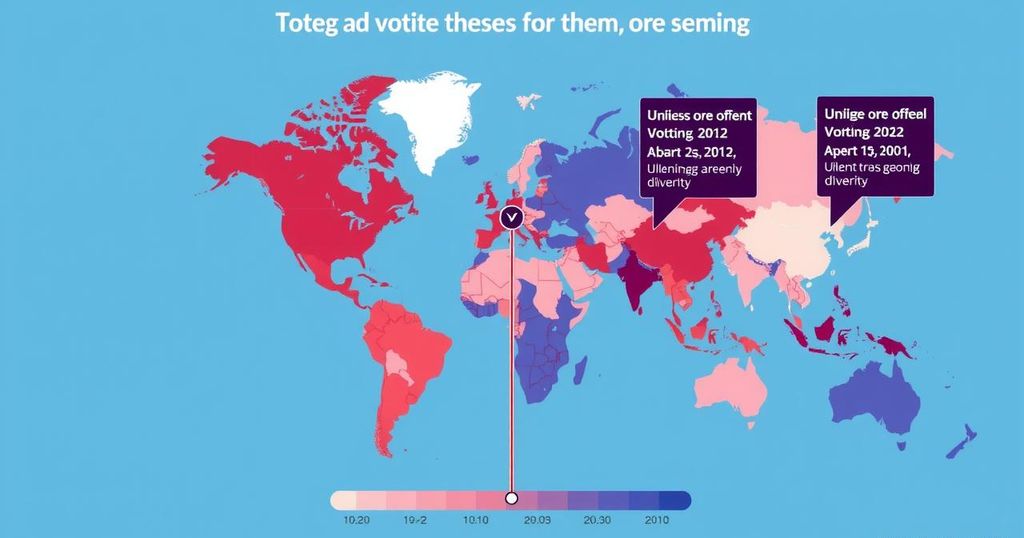Global Democracy: Highlights and Lessons from the 2024 Elections
In 2024, over sixty countries saw nearly half the global population participate in elections, reflecting a significant democratic engagement. However, results indicated a trend towards individualistic voting priorities, with economic issues overshadowing broader concerns like climate change. Notable election outcomes included the rise of populism and challenges faced by incumbents worldwide, while Russia’s elections exemplified the failures of true democratic practice. The interconnectedness of global politics becomes increasingly evident as nations navigate their respective challenges and expectations for future governance.
The year 2024 marked a significant event in global democracy, with over sixty nations, encompassing nearly half the world’s population, conducting elections to choose their leaders. Despite this notable engagement, the outcomes revealed persistent trends of selfishness and tribalism among voters, as many prioritized immediate personal interests over collective well-being. This shift towards consumerism was evident in various countries, notably in the United Kingdom and the United States, where economic concerns largely influenced electoral results.
In the United Kingdom, the Labour Party’s decisive victory was fueled by public dissatisfaction with economic conditions, while in the United States, President Joe Biden faced challenges despite reducing inflation rates, as prices remained high and wages stagnated. As a result, voters turned to former President Donald Trump, reflecting a pattern where incumbents across the globe were penalized at the polls for economic hardships—an issue exacerbated by the lingering effects of COVID-19 and the conflict in Ukraine.
Prominent elections in India and South Africa echoed this trend, with significant losses for established parties amid economic discontent. Conversely, some regions exhibited unexpected outcomes; for instance, Mexico saw its ruling party gain support, while in Bangladesh, political unrest led to the abrupt ousting of Sheikh Hasina, showcasing how public trust in leaders can rapidly diminish.
Among the noteworthy events, Trump’s victory in the U.S. and Emmanuel Macron’s call for a snap election in France highlighted the tensions between populist movements and traditional political structures. Macron’s electoral strategy was compelling, as it indicated the potential for countering populism in a political landscape marked by economic dissatisfaction.
However, not all democratic exercises reflected genuine choice; Vladimir Putin’s overwhelming win in Russia epitomized the perversion of democratic principles, marked by oppression of political opposition and limitations on media freedom. Meanwhile, the international landscape remains volatile, with implications for global stability, particularly with the looming relationship between Trump and Putin.
Looking ahead, the elections of 2024 signify both challenges and celebrations of democracy worldwide. The emergence of new political dynamics could shape the future from the Middle East to Asia, revealing how interconnected nations are in influencing each other’s democratic trajectories. Ultimately, the continuous practice of voting remains crucial as societies evolve, indicating that while democracy is an imperfect system, it thrives on participation and the enduring hope for progress.
The 2024 elections represent a landmark moment in democratic engagement, with nearly half of the global population participating in more than sixty elections. This unprecedented turnout underscores a significant shift in political participation over the past century, especially in countries where voting was once restricted. The subsequent voting patterns reveal deep-seated concerns about the economy, identity politics, and the effectiveness of current leaders across diverse political landscapes. However, the results also indicate an entrenched conservatism and reluctance to prioritize long-term global issues, such as climate change. The dynamics of contemporary elections are shaped by economic recovery struggles, the lingering effects of COVID-19, and geopolitical tensions like those stemming from the conflict between Russia and Ukraine. As nations grapple with the consequences of past decision-making, the lessons from these elections are manifold, illustrating the resilience and complexity of democratic processes worldwide. The varying outcomes highlight the necessity for leaders to address both immediate economic challenges and long-term existential threats that transcend national borders.
The elections of 2024 have provided critical insights into the state of global democracy, emphasizing the need for leaders to respond effectively to the economic and social issues confronting their constituents. The trend towards prioritizing personal and tribal interests over collective welfare poses significant challenges for established democracies. Furthermore, the outcomes reflect a growing global challenge: the balance between populist sentiments and traditional governance. Looking forward, the trajectory of democracy relies on sustained engagement and the ability of governments to address pressing concerns while fostering a more cohesive global community.
Original Source: edition.cnn.com




Post Comment